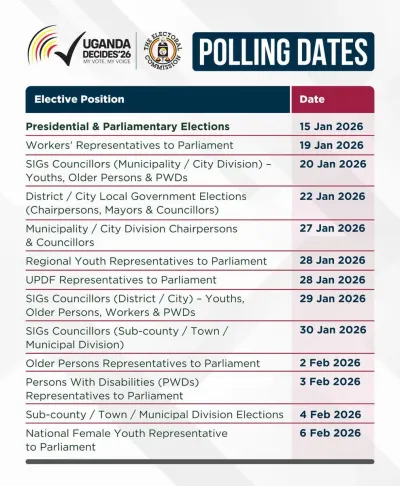
It is Ebbe Skovdahl who once said, except a few, do not see the “strong growth” in their lives.
Those lucky enough to have a job have not been paid salaries for months. Those owning a business will tell you things are not good; business is at its lowest. Many young people that left university last year will tell you they have spent most of the fiscal year walking the streets in search of any job but there are simply no jobs whatsoever. Those who borrowed money from financial institutions will tell you they are struggling to repay their debts. Parents will tell you they were unable to pay school fees for their children that recently returned to school.
So, where is this “strong growth” the BOU monetarists are seeing that nobody else is seeing? Although the generators and custodians of figures want to paint a picture of a strong economy, realities on the ground show things are not good at all. But this does not surprise some of us who are informed enough about the goings on in the economy.
Ugandan economy is retarded. The structure of this economy is uncharacteristic of a well-functioning or ‘normal’ economy. Normally, as countries undergo economic transformation, they progress from agriculture to manufacturing & finally to service-based economy — in that order. That is what happened in Europe & North America in the 17th and 18th Centuries respectively. That is what is happening in East Asia, Latin America & a few other progressive African countries.
We behave like a developed country!
In Uganda, the economy is changing in a strange pattern. The service sector is dominating in contribution to GDP. Over 53% of Uganda’s GDP now comes from services. Industry follows with about 25%, while agriculture contributes 14% according to the latest data from Ministry of Finance and the Uganda Bureau of Statistics (UBOS).
This pattern of transformation or structural change in Uganda does not follow the normal path. The economy has rapidly moved from agriculture directly to services, without first undergoing the mandatory industrial revolution. Actually, someone who doesn’t know Uganda may, on looking at the statistics above, think that it is developed country.
It is only when countries have taken-off that their service sectors start to contribute more to GDP than Industry does. For example, in Japan services now contribute 72% to GDP, while industry contributes 26%.
In China, the GDP share of services exceeded manufacturing for the first time in 2013. In Vietnam, another emerging economy in East Asia, the sectoral composition of GDP is changing normally, currently standing as follows: Agriculture (19%); Industry (43%); and Services (38%).
Why has Uganda seen its path to economic transformation distorted? The deeper issue that Uganda faces today concerns the appropriate roles of the State & the market. Prior to the 1987 Economic Recovery Programme, there was too much Government & too little market. Government failures had ruined the economy so much so that there was a general shortage of goods and services, and all macroeconomic indicators such as prices, exchange rates and interest rates were distorted.
Too much market, too little government
When a question was posed; “why is the economy doing so badly?” Multilateral agencies, the World Bank and the International Monetary Fund (IMF), and the U.S. Treasury responded in unison, “Government is the problem.” So, in a bid to remove government from the functioning of the economy, we were asked to liberalise, deregulate, and privatise.
When we were told to liberalise, we took it literally to mean that government had no role at all to play. From then on, whenever Ugandans came out to ask their government to correct the numerous market failures that the excessive capitalism had created, authorities at Bank of Uganda and Ministry of Finance chorused their favourite response, “This is a free market economy; we have nothing to do with it.”
Today, many of Uganda’s problems stem from too much market and too little Government. To put it another way, while Government is doing some things that it shouldn’t, it is also not doing some things that it should. This is what has retarded Uganda’s economy.
Our government is behaving as if markets are self-regulating. Before even we think about the economy, first look at what is going on in our daily lives. How can a responsible government let televisions show x-rated videos and movies at 10am when children are having breakfast? Mr. President, how can you let untrained “nurses” and “doctors” to kill people simply because you want to allow private clinics to flourish? How can you let capitalists to run schools and ask parents to pay Shs. 1.5 million to have their 5-year old children draw cartoons in nursery classes?
Mr. President, when economists encourage countries to allow “free markets” to allocate resources, they do not mean that countries should build “free-for-all markets”. What we have in Uganda today are not free markets but free-for-all markets — unregulated and thus unguided markets that have been left on their own to decide what is wrong or unaccepted and what is right or accepted.
Ugandans can only afford micro-credit
When Bank of Uganda allowed banks to determine deposit rates they are willing to offer their savers, banks offered nearly nothing and as a result we are witnessing a savings crisis in this country. Only irrational individuals can save in a bank that offers a 3% reward a year, yet inflation is running at 7%. Simple arithmetic shows the “saver” will actually be losing 4% of the value of their money.
Secondly, liberalisation of lending rates charged by banks on those who borrow from them led to predatory behaviour. When Ugandans go to borrow from these banks that received the credit from them at 3%, they are charged a lending rate of 23%. Officials at BOU often tell people they have nothing to do with that!
So how do you expect Ugandans to build industries? Can anyone serious borrow at 23% interest rate to build a factory to process mangoes? How would you pay back? No wonder people have resorted to micro credit, and because it is micro they can also only invest in micro businesses — saloons, bars, retail shops, boda-bodas, restaurants etc. These are the activities that comprise the dominant services sector.
Thirdly, this government has for years underinvested in public sector, especially infrastructure. By the time we woke up, Uganda was ranked among the countries with shockingly very poor physical infrastructure — roads, energy, railway, and ICT. This condemned us into a position among those with the highest cost of doing business on this planet. So we cannot attract any serious industrialists.
Ugandans no longer sleep!
Fourthly, this government is also not doing enough to protect the environment against degradation. Nearly half of the forest cover has been cut down, and wetland destroyed under government’s watch. Consequently, climate change is fast making the agricultural sector unproductive.
Inequality of income is also worsening every passing day. I recently wrote in these pages that in Uganda the poor no longer sleep because they are hungry, and the rich do not sleep because the poor are awake!
Mr. President, your government is also not doing enough, actually not at all, to control population growth. Currently, the population is growing at 3.4% per year, the 5th highest population growth rate in the world; while the fertility rate of 6 children per woman, is the 2nd highest in the world.
These are some of the factors that are retarding our economy, making it unable to sustain growth and/or transforming in a proper pattern. The reason the economy is not creating enough jobs for the youth; doesn’t generate enough tax revenue to support the growing expenditures of government; doesn’t redistribute incomes amongst the people, is mainly because its structure is abnormal. The sector that contributes the lowest to GDP (agriculture) is the one employing over 70% of Ugandans! This distortion is on the account of unguided capitalism that we chose in the hope that we shall build our economy in the image of the U.S.A.














Ramathan Ggoobi
Ramathan Ggoobi is Policy Analyst, and Researcher. He lecturers economics at Makerere University Business School (MUBS) and has co-authored several studies on Uganda's economy. For the past ten years, he has published a weekly column 'Are You Listening Mr. President' in The Sunrise Newspaper, Uganda's Leading Weekly
Leave a Comment
Your email address will not be published.